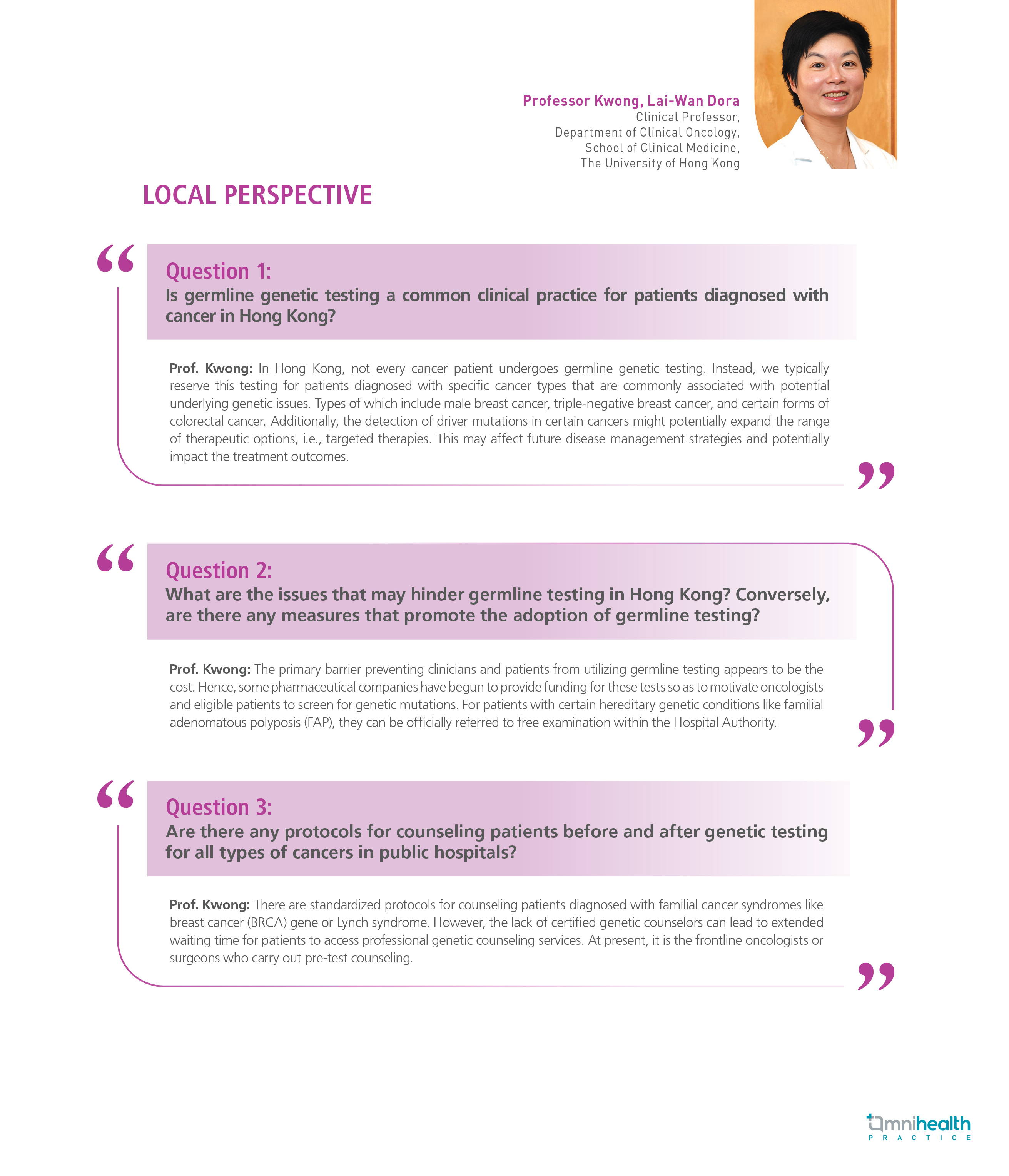CONGERENCE UPDATE: ASCO 2023
Genetic testing rates for cancer subpar with ethnical disparity
Germline genetic testing is essential in many aspects of cancer care, including but not limited to risk-adapted screening, secondary prevention, as well as cascade testing to identify relatives of patients who may be at an increased risk of cancer.1 Germline genetic testing also helps guide targeted therapies like poly-adenosine diphosphate (ADP)-ribose polymerase (PARP) inhibitors, and checkpoint inhibitors.1 While the scopes of guidelines are expanding, cost-effective testing kits offering wide coverage are also available.1 However, the use of these tests at the population level remains unknown.1 In ASCO 2023 annual meeting, Dr. Allison Kurian from the Stanford University School of Medicine, the United States (US), addressed this gap in research to further support advances in cancer care.1
In this study, data from patients aged ≥20 years who were diagnosed with any cancer between 2013 and 2019 from the statewide Surveillance, Epidemiology, and End Results (SEER) registries of Georgia and California in the US were identified and linked to the germline testing results obtained from 4 laboratories, which provided nearly all of the germline testing services in the 2 States from 2013 to 2021.1 The testing used was evaluated in patients diagnosed with all cancer types reported by SEER.1 Both pathogenic variants (PVs) and variants of uncertain significance (VUS) were evaluated in this study.1 Data were further divided into 4 distinct groups according to genes associated with major oncological diseases that are supported by clinical guidelines.1 The 4 groups comprised of breast/ovarian cancer-associated genes [including Breast Cancer gene (BRCA)1/2]; gastrointestinal cancer and Lynch syndrome-associated genes [MutL protein homolog (MLH)1, MutS homologs (MSH)2, MSH6, PMS1 Homolog 2 (PMS2), epithelial cell adhesion molecule (EPCAM)]; other hereditary cancer syndromes; and preliminary evidence genes without clinical guidelines.1
Among 1,369,660 participants with cancers diagnosed, only 6.8% were linked with gene testing results.1 Over the years, the median number of genes tested has increased from 2 in 2013 to 34 in 2019.1 Notably, a higher proportion of female patients were tested (13.9% vs. 2.2%), and a higher percentage of patients aged 20-49 years (22.1%) were tested as compared with those aged 50-69 years (8.2%), or ≥70 years (3.3%).1 Compared with non-Hispanic whites (NHWs), patients from other ethnic groups received less testing with Asians (OR=0.71; 95% CI: 0.58-0.66), followed by Hispanics (OR=0.62; 95% CI: 0.58-0.66), and blacks (OR=0.58; 95% CI: 0.55-0.63).1 The disparity was larger in cancers with long-established guidelines like breast and ovarian cancers, and did not decrease over time.1 Conversely, testing for both PVs and VUS increased from 2013 through 2019, with VUS results increasing at a higher rate across all ethnicities with the ratio of VUS to PVs increased most substantially in Asians (1.3 to 3.9), compared with blacks (0.8 to 3.6), Hispanic (0.7 to 2.2), and NHWs (0.6 to 1.7).1
In the multivariable model examining the testing trends by cancer types, there was an increase in the probability of testing over the years of diagnoses across all cancer types.1 Specifically, the male breast cancer group reached 50% testing throughout the period.1 Furthermore, there was a notable increase in testing for ovarian cancer (28% to 54%), pancreatic cancer (1% to 19%), and prostate cancer (0.1% to 4%), possibly due to the approval of PARP inhibitors.1 Yet, the testing rates remained low for lung cancer (0.1% to 0.8%) and all other cancer types (0.3% to 2%).1 Most of the identified PVs were associated with the diagnosed cancers, and have been noted in clinical guidelines with testing and management plans.1 Besides, male breast cancer patients had the highest association at 83.8%, followed by patients with ovarian cancer (82.0%) and female breast cancer (79.5%).1 The association was also high with patients with endometrial cancer (71.8%) and colorectal cancer (68.3%).1 Preliminary evidence genes with no practice guidelines for testing or management were present in 5.1%-28.1% of PVs across all cancer types.1
At the population level, genetic testing still falls short of guideline recommendations.1 This is especially true in cancers where disparities along ethnic lines are most pronounced and have proven as hard to address over time.1 In order to narrow the gaps, pre-test counseling should be streamlined, and post-test counseling needs to be extended to reach more individuals.1 Furthermore, long-term follow-ups of genetic testing are required to monitor patients’ conditions.1


Asprin may lower the risk for several gastrointestinal and colorectal cancer, reports up-to-date meta-analysis
An up-to-date meta-analysis investigated the relationship between regular aspirin consumption and cancers of the digestive tract sites. The review included 113 observational studies published up to March 2019, containing 45 colorectal

